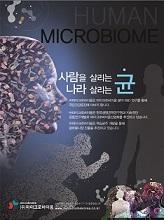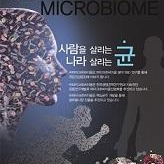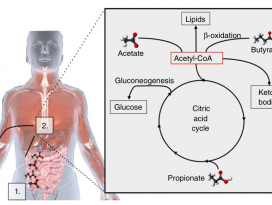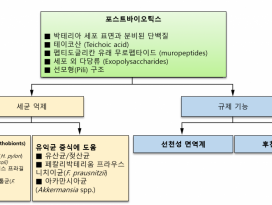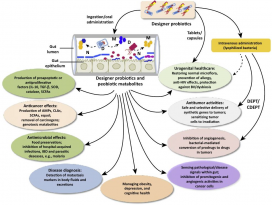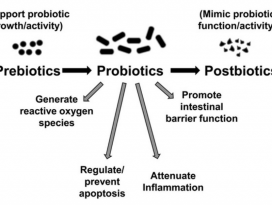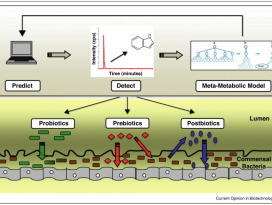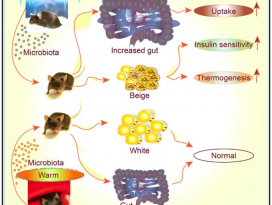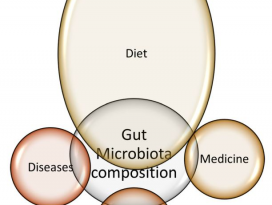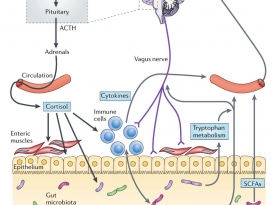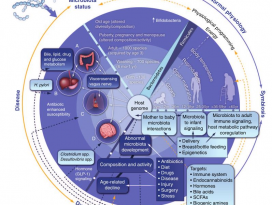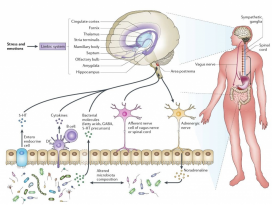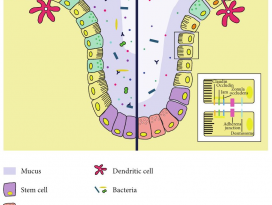[Gut Microbiome] Exercise-induced stress behavior, gut microbiota-brain axis and diet: a systematic review for athletes
- e 1409
Exercise-induced stress behavior, gut microbiota-brain axis and diet: a systematic review forathletes
Allison Clark andNúria Mach
| Abstract Fatigue, mood disturbances, under performance and gastrointestinal distress are common among athletes during training and competition. The psychosocial and physical demands during intense exercise can initiate a stress response activating the sympathetic-adrenomedullary and hypothalamus-pituitary-adrenal (HPA) axes, resulting in the release of stress and catabolic hormones, inflammatory cytokines and microbial molecules. The gut is home to trillions of microorganisms that have fundamental roles in many aspects of human biology, including metabolism, endocrine, neuronal and immune function. The gut microbiome and its influence on host behavior, intestinal barrier and immune function are believed to be a critical aspect of the brain-gut axis. Recent evidence in murine models shows that there is a high correlation between physical and emotional stress during exercise and changes in gastrointestinal microbiota composition. For instance, induced exercise-stress decreased cecal levels of Turicibacter spp and increased Ruminococcus gnavus, which have well defined roles in intestinal mucus degradation and immune function. Diet is known to dramatically modulate the composition of the gut microbiota. Due to the considerable complexity of stress responses in elite athletes (from leaky gut to increased catabolism and depression), defining standard diet regimes is difficult. However, some preliminary experimental data obtained from studies using probiotics and prebiotics studies show some interesting results, indicating that the microbiota acts like an endocrine organ (e.g. secreting serotonin, dopamine or other neurotransmitters) and may control the HPA axis in athletes. What is troubling is that dietary recommendations for elite athletes are primarily based on a low consumption of plant polysaccharides, which is associated with reduced microbiota diversity and functionality (e.g. less synthesis of byproducts such as short chain fatty acids and neurotransmitters). As more elite athletes suffer from psychological and gastrointestinal conditions that can be linked to the gut, targeting the microbiota therapeutically may need to be incorporated in athletes’ diets that take into consideration dietary fiber as well as microbial taxa not currently present in athlete’s gut. |
제목
운동에 기인한 스트레스 행동 및 장내 미생물-뇌 축과 식이 요법: 운동 선수에 대한 체계적 검토
내용
피로, 기분 장애, 성능저하, 위장 장애는 선수들이 훈련 및 시합을 하는 중에 흔하게 발생한다. 강렬한 운동을 하는 동안의 정신 사회적 요구 및 신체적 요구로 인해 교감 신경 – 부신 축과 시상하부 - 뇌하수체 –부신 축을 활성화하는 스트레스 반응이 시작되고, 스트레스 반응은 스트레스 호르몬, 이화 작용 (catabolic) 호르몬, 염증성 사이토카인 및 미생물 분자를 방출한다. 장(gut)은 신진대사, 내분비, 신경및 면역 기능을 포함하한 인간 생물학의 여러 측면에서 기초적이고 근본적인 역할을 하는, 수조 마리에달하는 미생물이 모여 사는 곳이다. 장내 미생물과 이들이 숙주의 행동,장벽(腸 壁) 및 면역 기능에 미치는 영향은 뇌 – 장 축의 중요한 측면으로 여겨진다. 쥐 모델을 통해 최근에 얻은증거는 운동 중 신체 및 정서적 스트레스와 장내 미생물 구성의 변화 사이에 높은 상관 관계가 있음을 보여준다. 예를들어, 운동으로 인한 스트레스는 맹장 내 Turicibacter spp의 수준을 감소시키고 루미노코커스 그나부스(Ruminococcus gnavus)를증가시켰으며, 이는 장 점액 분해 및 면역 기능에서 잘 정의된 역할을 한다. 식이 요법은 장내 미생물의 구성을 극적으로 조절하는 것으로 알려져 있다. 엘리트운동 선수들은 스트레스 반응이 상당히 복잡하기 때문에 (장 누수부터 증가된 이화 작용 및 우울증에 이르기까지), 표준 식이 요법을 정의하는 것은 어렵다. 그러나 프로바이오틱스및 프리바이오틱스를 이용한 연구로부터 얻어진 일부 예비 실험 데이터는 미생물이 내분비기관 (예: 세로토닌, 도파민 또는 기타 신경 전달 물질)과 같이 작용하고 운동 선수의 시상하부 - 뇌하수체 – 부신 축을 조절할 수 있다는 흥미로운 결과를 보여준다. 문제가 되는것은 엘리트 운동 선수를 위한 식이 권장 사항은 식물성 다당류의 낮은 소비를 기반으로 한다는 것이고, 이는미생물의 다양성 및 기능성의 감소와 관련된다. (예: 단쇄지방산(SCFAs) 및 신경 전달 물질과 같은 부산물의 합성의 감소) 더많은 엘리트 선수들이 장과 연결될 수 있는 심리적 질환 및 위장 질환으로 고통받기 때문에, 미생물을치료학적으로 표적화하는 것은 현재 운동 선수의 장내에 존재하지 않는 미생물 분류군뿐만 아니라 식이 섬유까지 고려한 운동 선수의 식단에 포함되어야할 수도 있다.
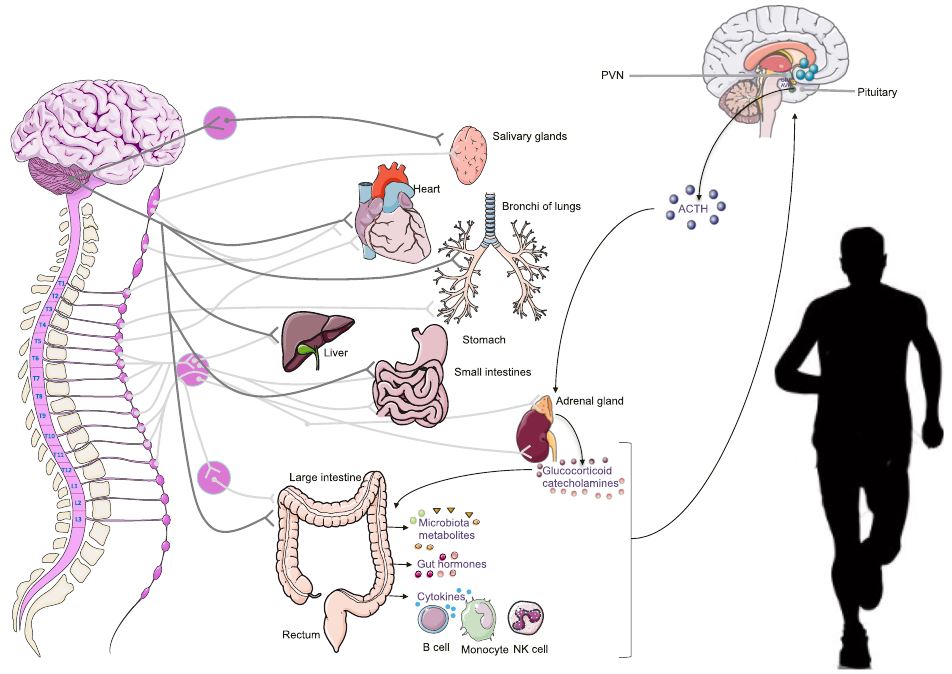
Fig. 1 Stress hormones released during high intense exercise.
스트레스 호르몬은 고강도 운동 중에 방출됩니다. (JISSN, 2016)
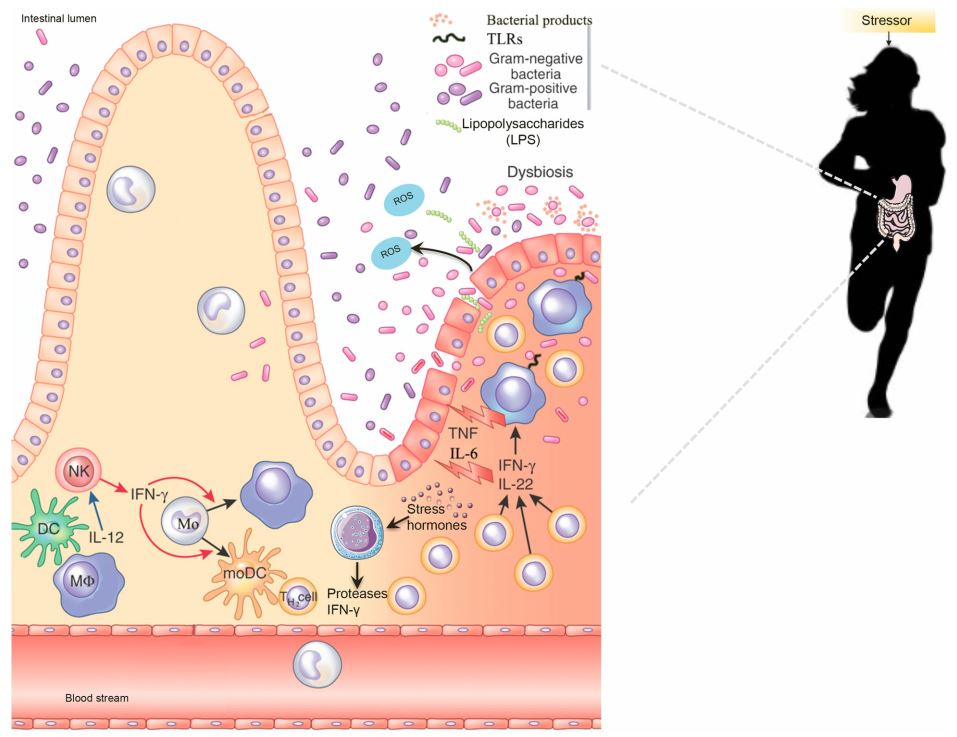
Fig. 2 Gastrointestinal disruption during high intensityexercise.
고강도 운동 중 위장 장애. (JISSN, 2016)
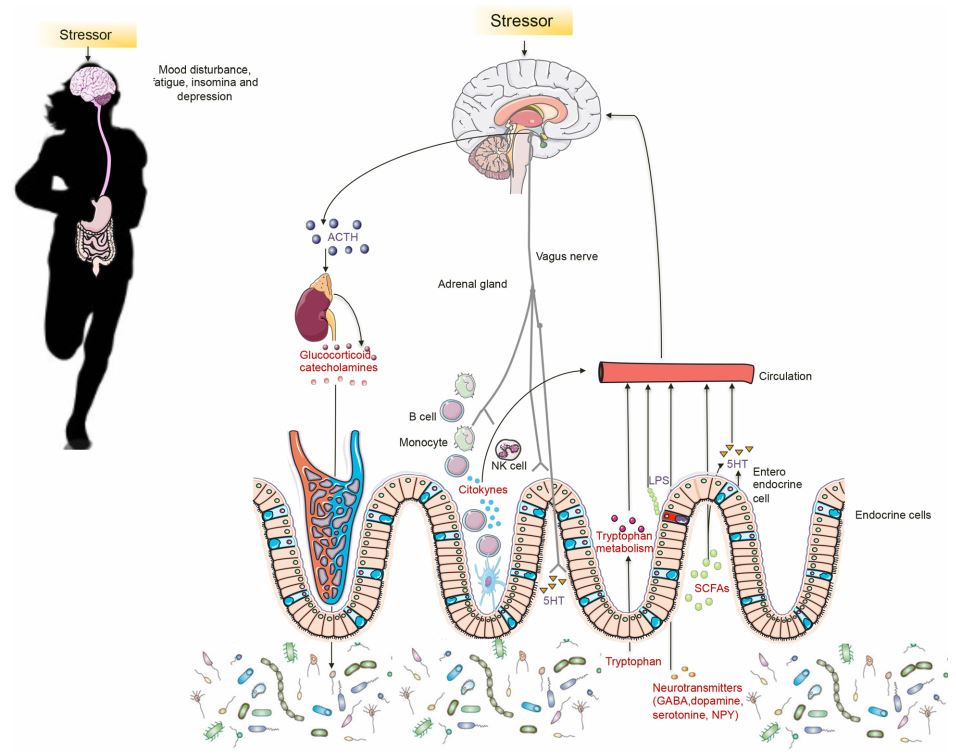
Fig. 3 Gut microbiota effects on mood disturbance, fatigue,insomnia and risk of depression during exercise.
기분 장애, 피로, 불면증 및 운동 중 우울의위험에 대한 장내 미생물 효과. (JISSN, 2016)
Keywords
: #Athlete #Stress #Behaviour #Diet #Exercise#Training #Competition #Neurotransmitters #Probiotics #Microbiome#Microorganisms#Microbes #Microbiota #GutMicrobiome #GutMicrobiota#Brain-gutAxis #GutMicrobiota-brainAxis
#운동선수 #스트레스 #행동 #식단 #식이요법 #다이어트 #운동 #훈련 #시합 #게임 #신경전달물질 #프로바이오틱스 #유익균 #마이크로바이옴 #미생물총 #미생물군 #미생물유전자 #장내미생물 #장내미생물총 #장내미생물군 #장뇌축 #뇌장축 #장내미생물뇌축
[출처: Clark, A.,& Mach, N. (2016). Exercise-induced stress behavior, gut-microbiota-brainaxis and diet: a systematic review for athletes. Journal of theInternational Society of Sports Nutrition, 13(1), 43.]
|
| ㈜마이크로바이옴 ㈜마이크로바이옴은 생명공학 최고의 기술력을 바탕으로 마이크로바이옴 산업의 성장과 발전의 선도적 역할을 하고 있는 대한민국 대표 마이크로바이옴 R&D 전문 기업입니다. ㈜마이크로바이옴은 생명공학 국가연구기관인 한국생명공학연구원과 마이크로바이옴 관련 상품에 대하여 공동연구개발 및 기술이전을 통하여 공동특허 출원과 마이크로바이옴 상품화에 성공하였고, 마이크로바이옴 글로벌 기업이 되기 위하여 연구개발을 지속하고 있습니다. |
| no. | 제목 | 조회수 |
|---|
㈜마이크로바이옴 ㅣ 서울시 서대문구 연희로 77-12 영화빌딩2층
Tel :02-322-0302 l Fax : 02-322-0759
Copyright (c) Microbiome. Co. All Rights Reserved.
